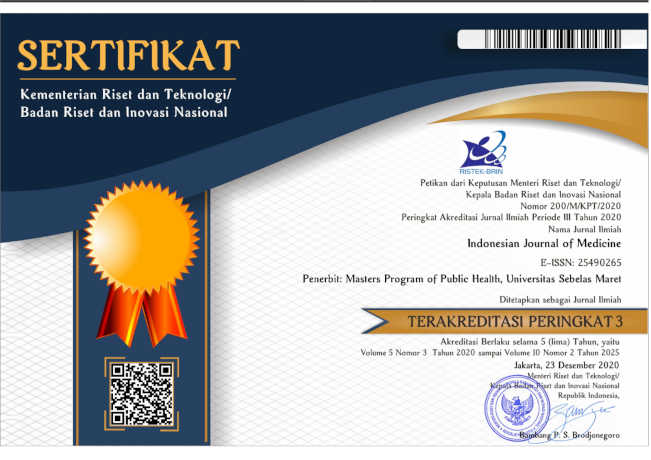The Effect of Ear Acupuncture in Reducing Body Weight in Obesity Patients: A Meta-Analysis
DOI:
https://doi.org/10.26911/theijmed.2021.6.1.360Abstract
Background: Obesity is now no longer considered a health problem in developed countries, but has also been faced by developing countries such as Indonesia. According to WHO, obesity worldwide has increased by more than two times from 1980. In 2016, there were 1.9 billion adults who were overweight and more than 600 million of them were obese or overweight. This study aims to analyze the effect of ear acupuncture therapy on weight loss.
Subjects and Method: This study was a systematic review and meta-analysis using the Randomized Controlled Trial design. The articles used in this study were obtained from several databases including PubMed, Google Scholar, Springerlink, Hindawi, and Sciencedirect. The articles used in this study were those published from 2008-2020. The article search was carried out by considering the eligibility criteria defined using the PICO model. P: obese patients (BMI ≥25), I: ear acupuncture therapy, C: no ear acupuncture therapy O: weight loss. The keywords for searching articles are as follows: "auricular acupuncture", AND "obesity", "auricular acupuncture for obesity" and "acupuncture obesity randomized controlled trial". The articles included in this study are full text articles with a Randomized Controlled Trial. Articles were collected using PRISMA flow diagrams. Articles were analyzed using the Review Manager 5.3 application.
Results: A total of 7 articles were reviewed in this study. The meta-analysis showed the results that ear acupuncture therapy was effective for weight loss in obese people (SMD= -0.74; 95% CI= -1.31 to-0.16; p<0.001). This meta-analysis combined primary research from Korea, Taiwan and Iran.
Conclusion: Ear acupuncture therapy affects weight loss in obese people.
Keywords: auricular acupuncture, obesity, randomized controlled trial
Correspondence: Utami Pangestu. Masters Program in Public Health, Universitas Sebelas Maret, Jl. Ir. Sutami 36A, Surakarta 57126, Central Java. Email: utamipangestu@gmail.com
Indonesian Journal of Medicine (2021), 06(01): 23-31
https://doi.org/10.26911/theijmed.2021.06.01.03.
References
Abdi H, Parized P, Zhao B, Mobarhan M, Tavallaie S (2012). Effects of auricular acupuncture on anthropometric: A randomized controlled trial study. The Journals of alternative and Complementary Medicine 18(7): 668-677. DOI: 10.1069/acm.2011.0244.
Alexandre L, Long E, Beales I (2014). Pathophysiological mechanisms link-ing obesity and esophageal adenocar-cinoma. World J Gastrointest Patho-physiol. 5(4): 534-549. https://dx.doi.org/10.4291%2Fwjgp.v5.i4.534.
Arisman (2011). Diabetes Mellitus. Dalam: Arisman, ed. Buku ajar ilmu gizi obe-sitas, diabetes mellitus dan dislipide-mia (Diabetes mellitus. In: Arisman, ed. Textbook of Nutrition Science of Obesity, Diabetes Mellitus and Dyslipidemia. Jakarta: EGC.
Cha SH, Park H (2019). Effects of auricular acupuncture on obesity in adolescents with obesity. Complementary Thera-pies in Clinical Practice. (35): 316-322. doi: 10.1016/j.ctep.2019.03.014.
Departemen Kementerian Kesehatan RI (2017). Pedoman Proses Asuhan Gizi di Puskesmas (Guidelines for Nutri-tional Care Process at Community Health Center). Jakarta: Kemenkes RI.
Hsieh CH (2011). Effects of auricular acu-puncture on weight reduction and abdominal obesity in Asian young adult: A randomized controlled trial. The American Journals of Chinese Medicine 39(3): 433-440. DOI:10.11-42/S01924415X11008932.
Hsu Chung-Hua, Chou Pesus (2008). The effect of auricular acupuncture in obese woman: A randomized control-led trial. Journal of Woman’s Health. 18(6): 813-818. DOI:10.1089/jwh.20-08.1005.
Kim D, Ham KO, Kang C (2014). Effects of auricular acupuncture ussing sinaps alba seeds on obesity and self-efficacy in female collague student. The Jour-nals of alternative and Complemen-tary Medicine. 20(4): 258-264. DOI: 10.1089/1cm.2012.0283.
Murti B (2018). Prinsip dan Metode Riset Epidemiologi (Epidemiological Rese-arch Principles and Methods). Edisi V. Program Studi Ilmu Kesehatan Masyarakat, Program Pascasarjana, Universitas Sebelas Maret. Surakarta. Bintang Fajar Offsite Colomadu, Karanganyar.
Purnami I (2015). Prevalensi obesitas dan hubungan antara obesitas dengan kejadian hipertensi dan proteinuria pada anak usia 12-14 tahun di sekolah menengah pertama swasta di Kota Denpasar (Prevalence of obesity and relationship between obesity and incidence of hypertension and proteinuria in children ages 12-14 years in Private Junior High Schools in Denpasar City). Tesis. Program Studi Ilmu Bio-medik Program Pascasarjana. Univer-sitas Udayana. Denpasar.
Set T, Cayir Y, Pirim A (2014). Effect of ear acupuncture therapy for obesity on the depression of obese women. Acu-punct Med. 32(5): 427-429. https://doi.org/10.1136/acupmed-2014-010-626.
WHO (2016). Overweight and obesity fact sheet, [online]. http://www.who.int
/mediacentre/factsheets/fs311/en/ [diakses September 2020].
WHO (2017). Obesity and Overweight. http://www.who.intt/mediacenter/facesheet/fs311/en/. Accessed November 2020.
Yeh CH, Yeh SCJ (2008). Effects of ear points pressing on parameters related on obesity in non-obese healty and obese volunteers. The Journals of alternative and Complementary Medicine 14(3): 309-314. Doi: 10.1089/acm.2007.0678.
Yeo S, Kim KS, Lim S (2014). Randomised clinical trial of ear acupuncture points for the treatment of overweight people. Acupunct Med. 32(2): 132-138. https://doi.org/10.1136/acupmed-2013-010435.











